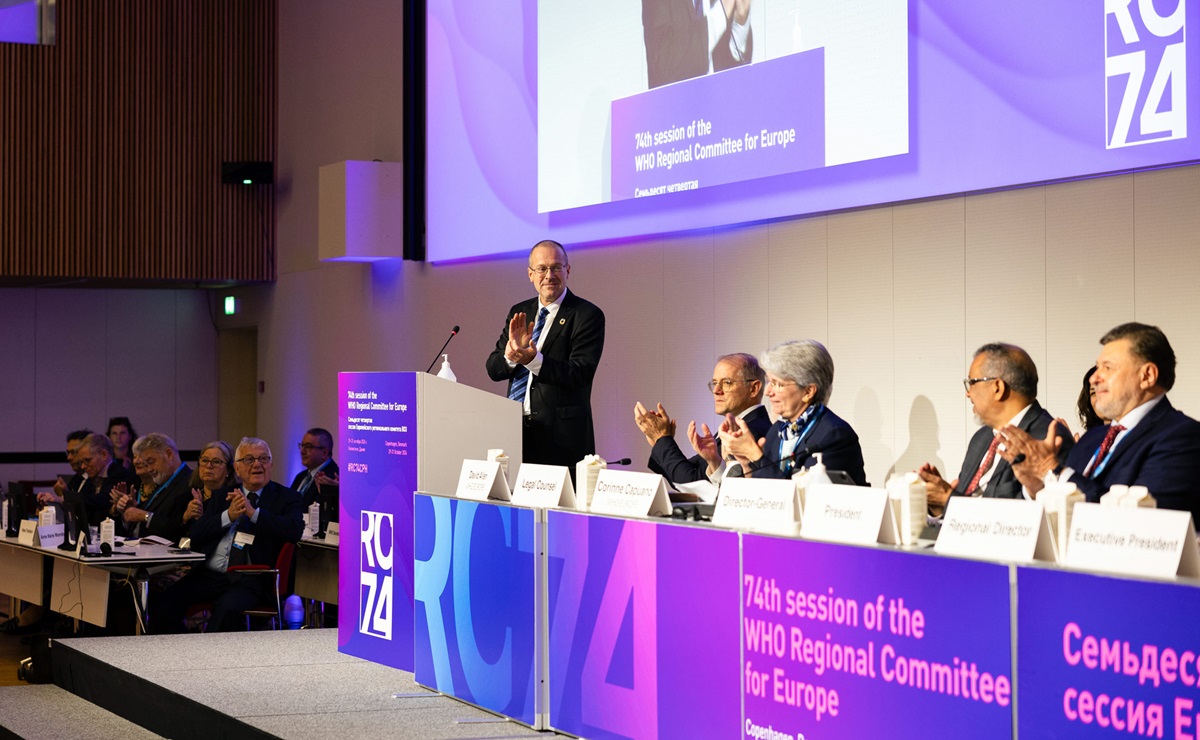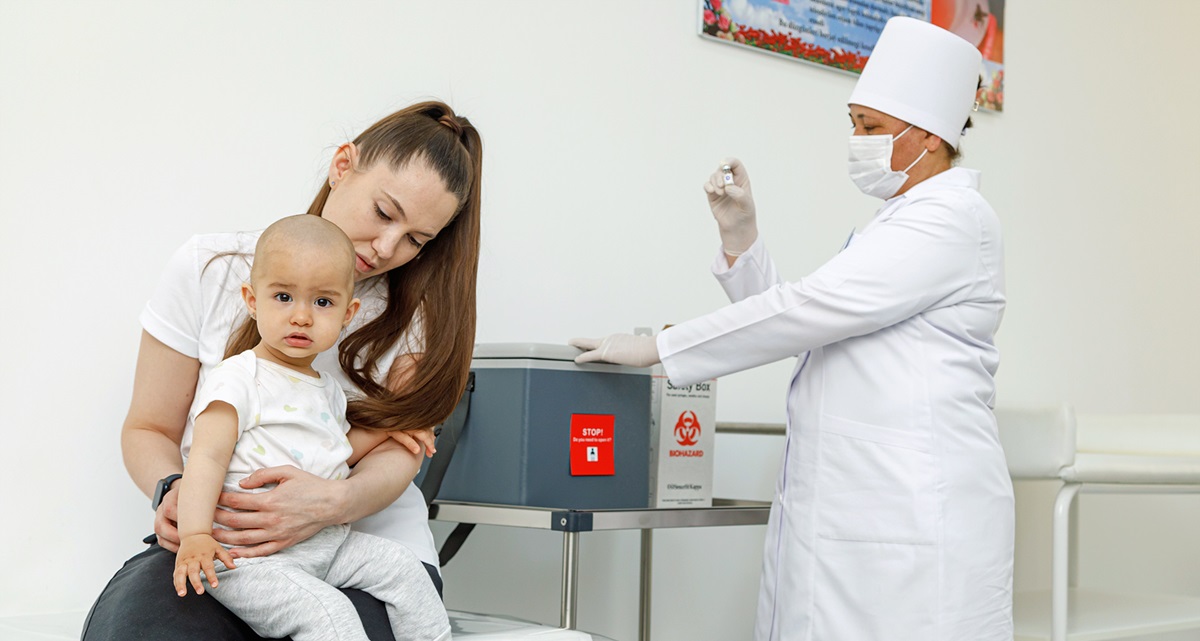No images? Click here
74th session of the WHO Regional Committee for Europe
29–31 October 2024, Copenhagen, Denmark
United Action for Better Health – our promise, now and always
Ladies and gentlemen, over the past 5 years we have seen profound changes that impacted the world and this Region which concern health. There are new urgent priorities that have emerged, such as lack of access to medicines and a shortfall of health-care workers. WHO estimates that by 2030, the world will be short by 10.2 million health-care workers. Health systems have been faced with crises of an unprecedented scale – COVID-19, devastating earthquakes and, more and more, the tangible results of climate change: wildfires and droughts. In this Region alone, every year 175 000 people die due to heat. The geopolitical balance has been drastically upset due to devastating wars. We could never imagine that, since we met in Astana last year, WHO has reported 444 attacks on health care – more than 1 per day. Dr Tedros [Adhanom Ghebreyesus] and I will continue to denounce in the strongest possible terms any attack on health-care workers and health facilities – a very clear breach of the international humanitarian law.
Preventing a triple threat this autumn and winter: applying lessons and understanding individual risk to protect ourselves and others from respiratory illness
9 October
2024–
31 March 2025
Every year, WHO/Europe calls on individuals, communities and governments to protect their most vulnerable during autumn and winter. Since the onset of COVID-19, our populations have been exposed to a triple threat of 3 main co-circulating viruses: COVID-19, influenza and respiratory syncytial virus. These viruses can affect anyone, anywhere.
ARMENIA REFUGEE RESPONSE
UKRAINE EMERGENCY
WHO and European Observatory support financing of rehabilitation care in Ukraine
07-10-2024
Compassion in a time of crisis: how Czechia is supporting Ukrainian refugees
10-10-2024
Ukraine emergency situation reports
COVID-19
Increasing Recognition, Research and Rehabilitation for Post COVID-19 Condition (long COVID)
WHO remains committed to learning more about long COVID and to finding ways to improve the medium- and long-term outcomes for people affected by it.
Partnering with the European Union to support deployment of COVID-19 vaccines and vaccination
The EU and WHO/Europe together provide critical assistance to Member States of the WHO European Region to ensure local readiness for safe and effective vaccination campaigns against COVID-19
CLIMATE CRISIS: EXTREME WEATHER
Braving the blaze – the health
toll paid by firefighters in Greece
23-10-2024
The unseen toll of floods: Prioritizing mental well-being in Bosnia and Herzegovina
18-10-2024
Q&A: Public health advice in the aftermath of flooding: how to protect your health and keep safe

31-10-2024
The 53 Member States of the WHO European Region have adopted a new framework on resilient and sustainable health systems, marking a significant shift in the vision for health delivery across the Region. Building on the Tallinn Charter: Health Systems for Health and Wealth, and on the 2023 Tallinn outcome statement, the new framework is a blueprint for countries to adopt and set out a transformational agenda for strengthening health systems, ensuring that they are resilient, sustainable, and responsive to the diverse needs of populations in a rapidly changing global landscape.
The framework, developed in close consultation with Member States and civil society and officially adopted at the 74th session of the WHO Regional Committee for Europe, outlines a new vision where every person has “access to the right care, at the right time, in the right place, from the right person, without experiencing financial hardship”. It emphasizes the critical need for relationships of trust in health systems, quality care delivered by motivated and supported health-care professionals, and the importance of health systems adapting to future challenges, including rising multimorbidities, mental health burdens, and the ongoing impacts of climate change. Read more
Advancing the implementation of the One Health approach in the WHO European Region
29-10-2024
Piecing a life back together: Stacie’s stroke recovery and the power of writing
28-10-2024
Accelerating digital health transformation in Europe: a two-year progress report
28-10-2024

30-10-2024
The Member States of the WHO European Region have nominated Dr Hans Henri P. Kluge to the office of WHO Regional Director for Europe for a second 5-year term, which will begin in February 2025 after his formal election by the WHO Executive Board.
Member States at RC74 have also been discussing how to work with WHO/Europe and within their own countries to tackle 4 pressing issues: 1)adopting a framework for resilient and sustainable health systems, underpinned by strong levels of trust, a renewed commitment to primary health care and increased investment in the health workforce; 2) strengthening health emergency preparedness, response and resilience in the European Region – also known as Preparedness 2.0; 3)enhancing emergency medical teams capacity up to 2030, to ensure rapid deployments to acute health emergencies wherever they occur; and 4)developing a strategy for harnessing health innovations and emerging technologies in the Region, which will be presented for endorsement in 2025. Read more

24-10-2024
The WHO European Region retained its poliomyelitis (polio)-free status for 2023. This conclusion by the European Regional Commission for the Certification of Poliomyelitis Eradication (RCC) was based on annual reports for 2023 submitted by Member States. The reports provided clinical and environmental surveillance data indicating that:
- no wild poliovirus was circulating in the Region in 2023; and
- any importations or circulation would have been detected promptly by the existing health/surveillance systems.
The RCC also endorsed WHO’s formal closure of the 2022–2023 outbreak of circulating vaccine-derived poliovirus type 2 in Israel. The RCC expressed concern, however, that stagnated progress or setbacks in several countries, including suboptimal immunization coverage, incomplete poliovirus facility containment and lack of outbreak preparedness planning, have put the Region’s polio-free status at risk.
Read more
From stroke to speech: Andrea’s survival story and the crucial role of timely care
28-10-2024
Fighting breast cancer: how Diana found hope and became a voice for others
25-10-2024
Without alcohol I can be the father I’ve always wanted to be
25-10-2024
Boosting cross-border cooperation for health: initiatives from Lower Austria
21-10-2024
Interfaith engagement strengthens mental resilience in Israel
10-10-2024

EVENTS
Empowering public health leaders of tomorrow: Three new European Public Health Leadership Courses in Kazakhstan, Portugal and Ukraine
4 – 15 November 2024 Lisbon, Portugal; 1 – 12 July, Kazakhstan; 17 – 28 June, Ukraine
Effective communication in health care: a global perspective
19 November 2024, Online
Strengthening digital health literacy to empower people in the digital age
21 November 2024, 14:00–15:00 CET
Online training workshop: Measles and rubella elimination and maintenance of polio-free status in the WHO European Region
21 – 23 January 2025








